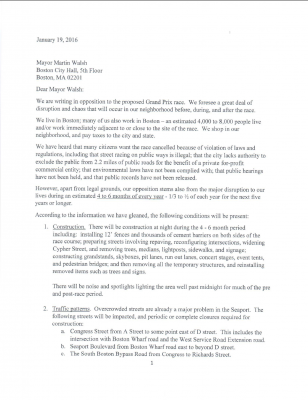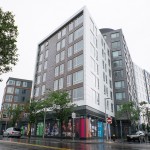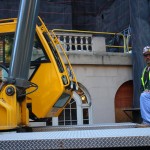
Responding to the IndyCar race scheduled for September in Boston’s Seaport District, the Coalition Against IndyCar Boston wrote a letter Tuesday to Mayor Martin Walsh opposing the race. The letter calls for the cancellation of the race, as well as a termination of Boston’s partnership with IndyCar.
The IndyCar Boston website describes the race, a Grand Prix, as “a three-day racing competition with multiple facets of entertainment and activities throughout the weekend.”
In the letter to Walsh, the Coalition Against IndyCar Boston said they were displeased with plans to begin construction for the event.
“We urge you not to sign a multi-year contract with the race promoter until public hearings have been held, and public records concerning the race have been released,” the letter stated. “In light of these concerns, however, it is our considered view that it’s time to terminate the city’s long term commitment to this even and cancel the race.”
The Coalition Against IndyCar Boston added that the event would cause disruption to the Seaport District before, during, and after the race.
“Mayor Walsh, we believe in Boston’s growth and are proud of the vibrancy of our Seaport district,” the letter stated. “But this race is completely disruptive of our lives for an inordinate period of time — several months of disruption every year for 5 years or long is far too long to bear. We do not understand how the city can commit for 5 years to an event like this, given the combined noise, traffic and construction impacts on the fastest growing neighborhood in Boston.”
Bonnie McGilpin, spokesperson for Mayor Walsh, said Walsh’s office is willing to engage in community discussion regarding the Grand Prix.
“The mayor is reviewing the letter, and his office is happy to meet with community groups to discuss the Grand Prix coming to Boston,” McGilpin said.
McGilpin added that Walsh and his associates are in favor of the Grand Prix and believe that it will bring positive press to the city.
“He remains confident that the event will be good for the city and bring visitors to Boston,” McGilpin said. “He has made it clear to IndyCar that community engagement is key to this process as it moves forward.”
Laurence Bishoff, spokesperson for the Coalition Against IndyCar Boston, wrote in an email that the coalition aims to communicate to the public the negative implications the event will have on the public.
“The more people that can know this, the more we think there will be a proper objection to the race by citizens who just don’t understand what the race is doing being plopped down on the busy district of Seaport,” Bishoff wrote in an email. “The more buzz we get, the more people we have, the better off we are. We’re pleased that there has been attention to this. We’re really just a group of citizens.”
Boston residents agreed that IndyCar Boston should cancel the Grand Prix and protect the city and its residents from potential annoyance and danger.
James Egana, 27, of Roxbury, said the excess amount of people the event could bring in would make city travel harder.
“I feel like Boston is really crowded enough as it is,” he said. “Bringing in all of those extra people is really not going to have any benefit and will probably just make traveling around the city more difficult.”
Lisa Shaver, 52, of Kenmore, said the threat of potential terrorist attacks is a reason for why the IndyCar event should be cancelled.
“[IndyCar is] endangering the public by creating large crowds, which gives an opportunity for a potential attack,” she said. “I recognize their desire to have fun and take part in an event that is meaningful to them, but they really need to take into account logistics.”
Shaver added that besides the danger of a terrorist attack, general public safety should be taken into account as well.
“I think that if they want to engage in a designated real race track not on the streets of Boston, they need to consider public safety,” she said.
Jeremiah Sullivan, 57, of Dorchester, said the drawbacks to the race are more significant than the fun it would provide.
“I think it would be interesting to see something like that and it would be a fun activity, but it probably isn’t worth all of the negatives that it brings to people in the neighborhood,” he said. “Especially if there are children around that could be affected by it, it’s probably not a good idea.”





Okay, I’m beginning to sense a theme here. Suddenly, any world-class event in Boston proper is a public evil.
While I agreed, in general, with the effort to quash the 2024 Olympic bid, this is a heavy blanket that does not need to be tossed on every event proposed and planned for this great city.
Boston is a world-class city, and as such is more than capable of handling and benefitting royally from an even such as this. If we want growth and exposure, we must allow events to happen without base and nagging claims such as, “it may attract terrorists”, and “it’ll be really hard to get around the city.”
Perhaps some measure of perspective is in order. These events are not rare, new, or uncommon to cities in the US. There are countless such events coast-to-coast. Nary a problem had, but for the cities involved the money comes rolling in. These complainants seems focused on “educating” the people of Boston on Grand Prix style events, but I wonder, based on the evidence they cite if they are themselves, “educated.”
IndyCar essentially fronts the money for the entirety of this event. Sorry a few of you will have to take a different route around your block for a few weeks, but life can be a bit rough at times.
It’s much more than just a weekend of blocked streets. The track and event facilities are being built on a hazardous waste site which is capped but not designed to have things built on it. Organizers are asking to skip EPA review. If what they’re doing it ok, why not involve the EPA?
The disruption is not simply one week. The organizers have already started to bring in the more than 3,000 barriers the track will need. The plan is to do the construction starting in May and have much it happen during the night. There are thousands of people, including many families, that live near the site and will have to deal with listening to heavy equipment grinding asphault at 4am.